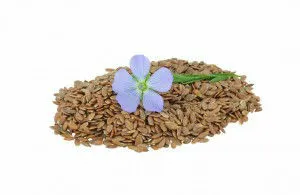If you don’t currently enjoy flaxseeds as a part of your healthy diet, they are one superfood that is definitely worth a try. These tiny seeds possess a warm, mild, slightly nutty flavor, are great on their own or as an addition to any salad or smoothie, and pack a huge nutritional punch.
Additionally, research suggests that flaxseeds may be able to slow the growth of certain hormonally-based cancers, such as breast and prostate cancer.
Flaxseeds contain a higher amount of essential, heart-healthy omega-3 fatty acids than any other vegetarian food source, with a whopping 38,325 milligrams in a 168 gram (just under six-ounce) serving.
This same serving size contains 46 grams of fiber, 31 grams of protein, and an abundance of minerals including calcium, iron, magnesium, manganese, phosphorus, potassium, iron, zinc, copper and selenium. They also contain B-vitamins, vitamin E and vitamin K.
The effect of flaxseeds on hormonally-based cancers may be attributed to their unique phytoestrogens, which have been found to help alleviate symptoms of hormonal imbalance, such as hot flashes in women. Byproducts of flaxseed also have antiestrogenic properties, which means they can bind to estrogen receptors and block more powerful estrogens from taking over.
A 2005 study performed at the University of Toronto in Ontario, Canada, gave breast cancer patients either a muffin containing 25 grams of flaxseed or a placebo muffin every day for just over a month.
Researchers observed an increase in apoptosis, or “programmed cell death,” in the tumors of the patients that had eaten the flaxseed muffins. This led the authors to conclude that, “dietary flaxseed has the potential to reduce tumor growth in patients with breast cancer.”
Another study, performed in 2008 at the University of Texas, tested the effects of flaxseeds on pre-surgery prostate cancer patients for a period of 30 days. The researchers noticed a slower growth in the tumors of those who had been given the flaxseeds and concluded: “Findings suggest that flaxseed is safe and associated with biological alterations that may be protective for prostate cancer.”

-The Alternative Daily
